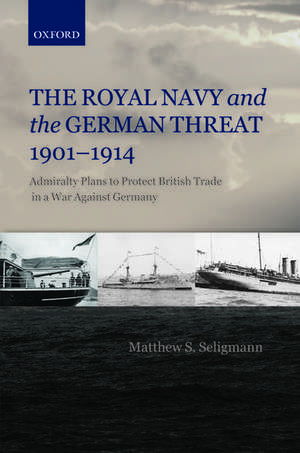The Royal Navy and the German Threat 1901-1914: Admiralty Plans to Protect British Trade in a War Against Germany
Autor Matthew S. Seligmannen Limba Engleză Hardback – 24 mai 2012
Preț: 787.70 lei
Preț vechi: 1133.75 lei
-31% Nou
Puncte Express: 1182
Preț estimativ în valută:
150.73€ • 164.24$ • 127.01£
150.73€ • 164.24$ • 127.01£
Carte tipărită la comandă
Livrare economică 12-18 aprilie
Preluare comenzi: 021 569.72.76
Specificații
ISBN-13: 9780199574032
ISBN-10: 0199574030
Pagini: 198
Dimensiuni: 164 x 240 x 24 mm
Greutate: 0.48 kg
Editura: OUP OXFORD
Colecția OUP Oxford
Locul publicării:Oxford, United Kingdom
ISBN-10: 0199574030
Pagini: 198
Dimensiuni: 164 x 240 x 24 mm
Greutate: 0.48 kg
Editura: OUP OXFORD
Colecția OUP Oxford
Locul publicării:Oxford, United Kingdom
Recenzii
An incisive politico-military history showing that a heretofore niche aspect of the Anglo-German naval race seriously troubled the British Admiralty throughout the Edwardian period. Discussion of ships, shells and security on the high seas is admittedly terse stuff, but the writing is sprightly and the result a timely dredging around the origins of the Great War after a century of resting, unrecovered, in an archival tomb.
a must-read for naval historians.
a serious, scholarly and original interpretation which future historians will have to take seriously.
The history of the Royal Navy in the years 1900â14 has become a lively and controversial field in recent years, and this book is a noteworthy addition to the growing body of scholarship critical of the revisionist arguments ... The book will be essential reading for anyone interested in the history of the Royal Navy in the Fisher era.
compelling and offers a number of valuable new perspectives
It is the single most important book on British strategy and naval history that have been published over the last 20 years.
essential reading for anyone interested in the history of the Royal Navy in the Fisher era.
the best treatment of the origins of the battlecruiser I have seen.
specialists in British naval history will welcome this book as an important and meticulously researched new addition to the literature on the British naval elite.
This is a good book.
a must-read for naval historians.
a serious, scholarly and original interpretation which future historians will have to take seriously.
The history of the Royal Navy in the years 1900â14 has become a lively and controversial field in recent years, and this book is a noteworthy addition to the growing body of scholarship critical of the revisionist arguments ... The book will be essential reading for anyone interested in the history of the Royal Navy in the Fisher era.
compelling and offers a number of valuable new perspectives
It is the single most important book on British strategy and naval history that have been published over the last 20 years.
essential reading for anyone interested in the history of the Royal Navy in the Fisher era.
the best treatment of the origins of the battlecruiser I have seen.
specialists in British naval history will welcome this book as an important and meticulously researched new addition to the literature on the British naval elite.
This is a good book.
Notă biografică
Dr Matthew S. Seligmann is a well-known historian of the pre-First World War era and has written numerous works on the international conflicts of this period. These include Rivalry in Southern Africa, 1893-99 (1998), Spies in Uniform (2006), and Naval Intelligence from Germany (2007). He has also written articles for such journals as BBC History Magazine, The English Historical Review, German History, Historical Research, The International History Review and The Journal of Strategic Studies. One of these, an essay entitled 'A Prelude to the Reforms of Sir John Fisher', won the 2007 Julian Corbett Prize, Britain's premier award for naval history. Another of his works, Does Peace Lead to War? Peace Settlements and Conflict in the Modern Age (2002), was selected by ALA's Choice magazine as one of its Outstanding Academic Titles for 2003.














